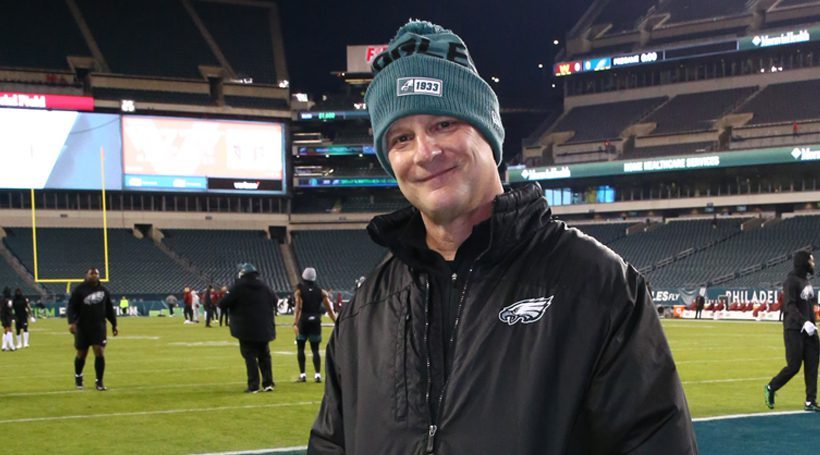It was halftime on a perfect Arizona night and Rihanna was on stage belting out her hits. The Eagles led the Kansas City Chiefs 24-14 and Chiefs star quarterback Patrick Mahomes was limping around with an ankle injury and life, honestly, could not have been more perfect.
Rihanna sounded great and Eagles fans on hand at State Farm Stadium were singing in harmony and, I admit it, visions of a second Lombardi Trophy for the Philadelphia Eagles in a span of 5 seasons whirred around in my head. I allowed myself to think – just for a moment – what could be with a second Parade of Champions and millions of fans gathering and singing “E-A-G-L-E-S, EAGLES” in every corner of our region.
And then the second half began.
Two hours later, after the Eagles lost in heartbreaking fashion, 38-35, to Kansas City in Super Bowl LVII, the caravan of 6 buses pulled up to the team hotel and the players, coaches and staff entered the lavish post-Super Bowl party that, after a victory like the one in 2018 in Minneapolis, is the most energetic, testosterone-filled, happiest-Eagles-place-on-Earth that you can imagine.
This time, not so much.
Lavish, yes. Energetic, not even close. Popular performer DJ Khalid bounded on stage and opened his set with his famous song “All I Do Is Win” with the lyrics “All I do is win, win, win no matter what…”
Thus started the tremendous Super Bowl-loss recovery process. There is nothing like the Super Bowl – the thrill that comes with winning the game brings an unmatched combination of exhaustion and adrenaline, and adrenaline wins because, well, you’ve won the darn Super Bowl. There is nothing greater than that when you work for a football team (as I have with the Philadelphia Eagles as the Eagles Insider since 1997) or if you’re a never-die fan of the team.
But when you don’t win, it is crushing. I’ve experienced this twice in my life – following the Eagles’ 24-21 loss to New England in the 2004 season (Super Bowl XXXIX) and then on February 12. The contrast between winning that game and losing it couldn’t be more profound and, as the months have gone by, more challenging to overcome.
Let me begin by saying this: Nobody with the Philadelphia Eagles will ever truly “overcome” losing that game. The Eagles were a great team – 14-3 in the regular season, 2 dominating wins over the New York Giants and San Francisco 49ers in the playoffs – and 22 healthy starters for Super Bowl LVII. They entered the Super Bowl at the top of the NFL heap. That the Eagles fell short against another outstanding team in Kansas City led by Mahomes and future Hall of Famer head coach Andy Reid casts no shame.
As we prepare for the 2023 season, the Eagles have recovered by keeping their foot on the gas, transitioning the roster quickly and re-loading for another championship run ahead. It just required some tender loving care and smart planning to reach this point.
But it was a volatile Super Bowl aftermath, at least for me. Upon returning to Philadelphia on the day after the Super Bowl and arriving to only a few dozen fans, instead of the tens of thousands after winning 5 years earlier, the intense disappointment and exhaustion set in immediately. The first week of sleep was restless at best, with strange dreams that included locating a long-lost childhood friend acting as a double agent in Great Britain (at least it forced me to look him up, safely living a normal life in the area here).
Three days after the Super Bowl, I played 9 holes of golf and then, on the way home on an unusually nice February day, I took a phone call on my car’s speakerphone, hung up and within minutes (seconds?) I felt rumble strips. I woke up just as my automobile hit plastic cones on the side of the highway, just short of a concrete partition. It was a close call and I didn’t push it: I pulled over at the next exit and slept for 30 minutes with my driver’s seat reclined.
The Eagles made sure to give everyone space and time, but less than 2 weeks later I hosted an event for girls flag football that included a burgeoning South Jersey community of coaches. Standing in front of the audience, I felt sticky and clammy and sweated uncontrollably at the podium, nervous and unsure of what to say.
Losing the game, well, it sucks. This league is one that requires everyone to have a short memory, a great work ethic and resilience, so here we are.
“I’m just not ready for this,” I said to Eagles linebacker Haason Reddick, the South Jersey native who had a starring role in the team’s 2022 success and is a key for this season as well. “I feel like not winning, it just let everybody down.”
“Same with me,” Reddick said. “I haven’t moved much since the game. It’s a lot to get over.”
It sure is, and nobody is crying about the good fortunes of reaching the Super Bowl and falling just 4 points short. Everyone in an NFL organization works every day for weeks and weeks leading into the dream-come-true reality of reaching the Super Bowl, and the week of the event is non-stop. It is the best feeling.
Losing the game, well, it sucks. This league is one that requires everyone to have a short memory, a great work ethic and resilience, so here we are. Only a month after the Super Bowl loss the Eagles were in Indianapolis for the NFL’s Scouting Combine and I spoke with Eagles General Manager Howie Roseman about the present and the near future.
“We’re going to have change,” he said, “and that doesn’t have to be a bad thing…”
Well, there has been change and, as it looks on paper, the Eagles are definite contenders. The regular season is about to start and we’re all ready for the climb. We’re ready for the work and the challenge of reaching the Super Bowl in Las Vegas and bringing back a second Lombardi Trophy – and loving every bit of the exhaustion and adrenaline.














